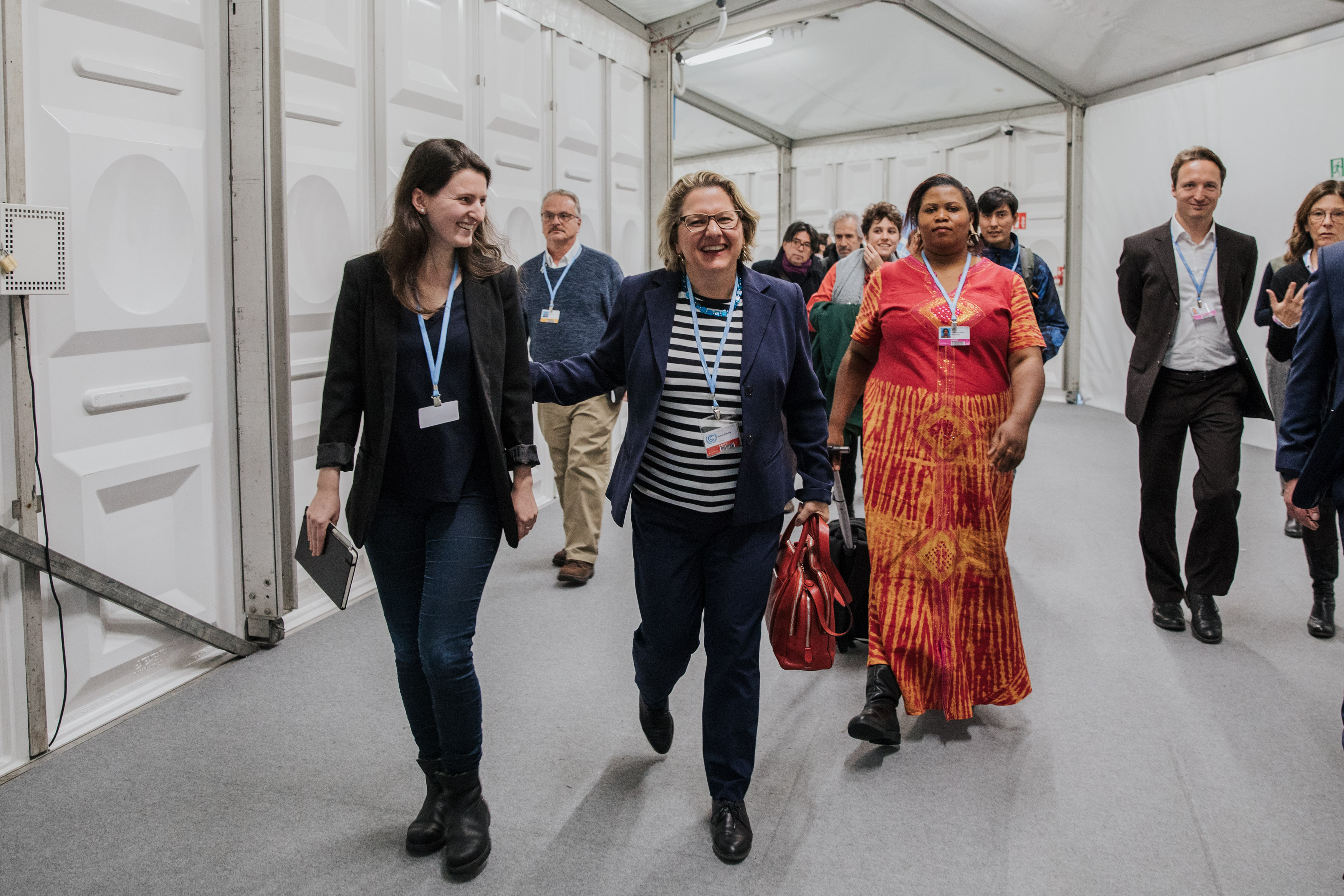COP24 blog - Germany's environment minister rejects hypocrisy criticism
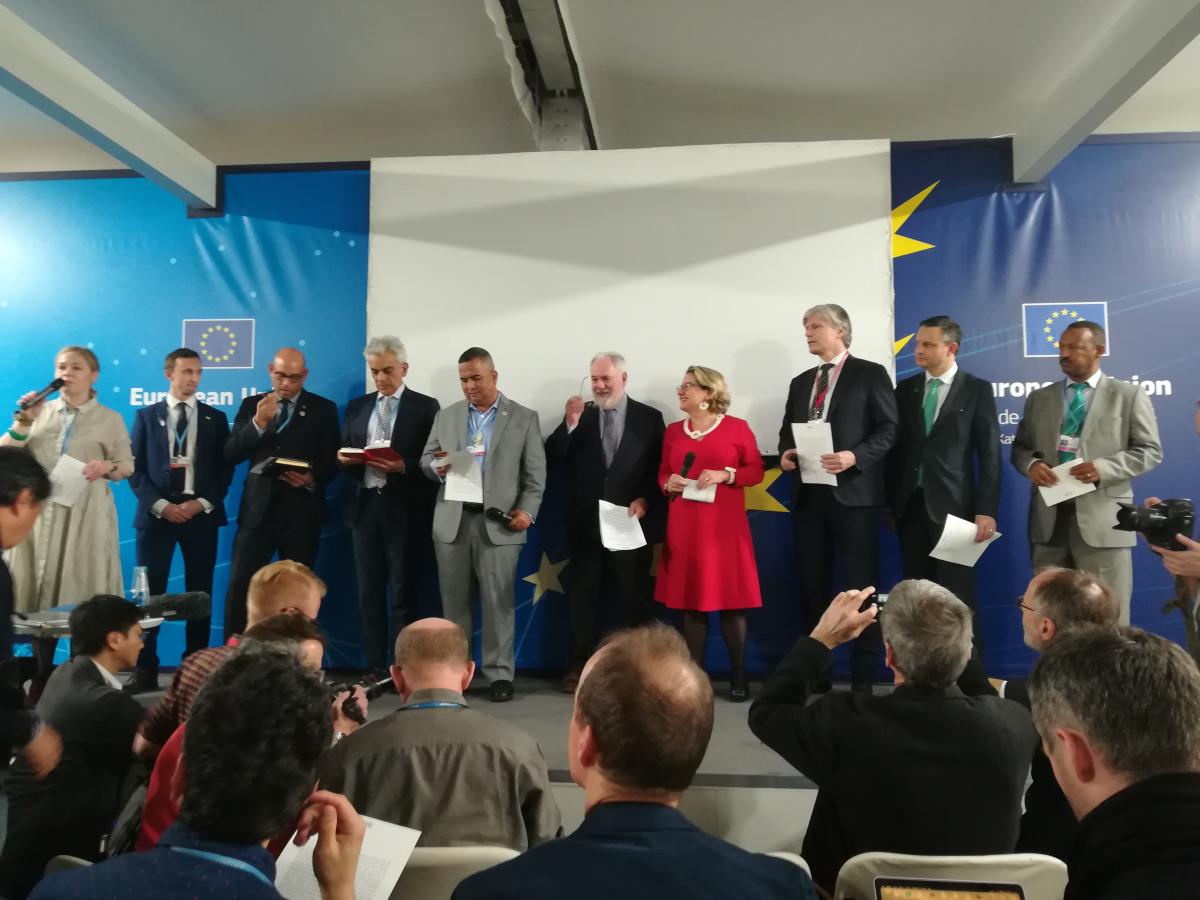
High Ambition Coalition calls to step up climate action in response to 1.5°C report
The High Ambition Coalition, a group of countries composed of some of the richest and poorest nations of the world, has called to step up climate action in response to the landmark Special Report on 1.5°C as negotiations are heading into what German environment minister Svenja Schulze has predicted to be a “very long night”.
“We will keep pushing for more ambition,” said EU climate and energy commissioner Miguel Arias Canete at a press conference convened on short notice. In a statement, the group which includes Canada, Argentina, Germany and the European Union, writes “we are determined to step up our ambition by 2020, consistent with the long-term temperature goal of the Paris Agreement.”
At the press conference, Schulze said “We need more accountability, we need a robust rulebook, we need more courage, we have to reassess and improve our climate action. We need more solidarity and support for the vulnerable countries.
Germany’s special double phase-out challenge
“Disruptive innovation” is the answer to increased climate action and reaching emission reduction targets, is “, Andreas Pinkwart (FDP), economy minister of Germany’s most populous state North Rhine-Westphalia said at an industry side even at the Katowice COP. He stressed that creating a level playing field for businesses was crucial.
Pinkwart said Germany was in a very special position because “as one of the largest industrial countries, it has decided to move out of nuclear power and coal – only very few countries move out of both technologies”. He added that coal power was still needed in North Rhine-Westphalia but also in the industrial hub of Baden-Württemberg in order to secure a stable power supply for “citizens and businesses”. “We can only phase-out coal as fast as technically possible,” he said, pointing to a lack of power lines and the nuclear phase-out as the reason why Germany was still so dependent on coal.
Some energy experts say that Germany would be able to phase-out coal-fired power production by 2030 without facing power supply insecurity and even remain a net power exporter. The head of the miners’ union IGBCE, a member to the coal commission meanwhile, has repeatedly talked about an inevitable end to lignite mining at 2045.
Markus Söder (CSU), state premier of another economically very successful German state, this week called for a national coal exit, support for gas-fired power plants and regional capacity markets to secure power supply at all times.
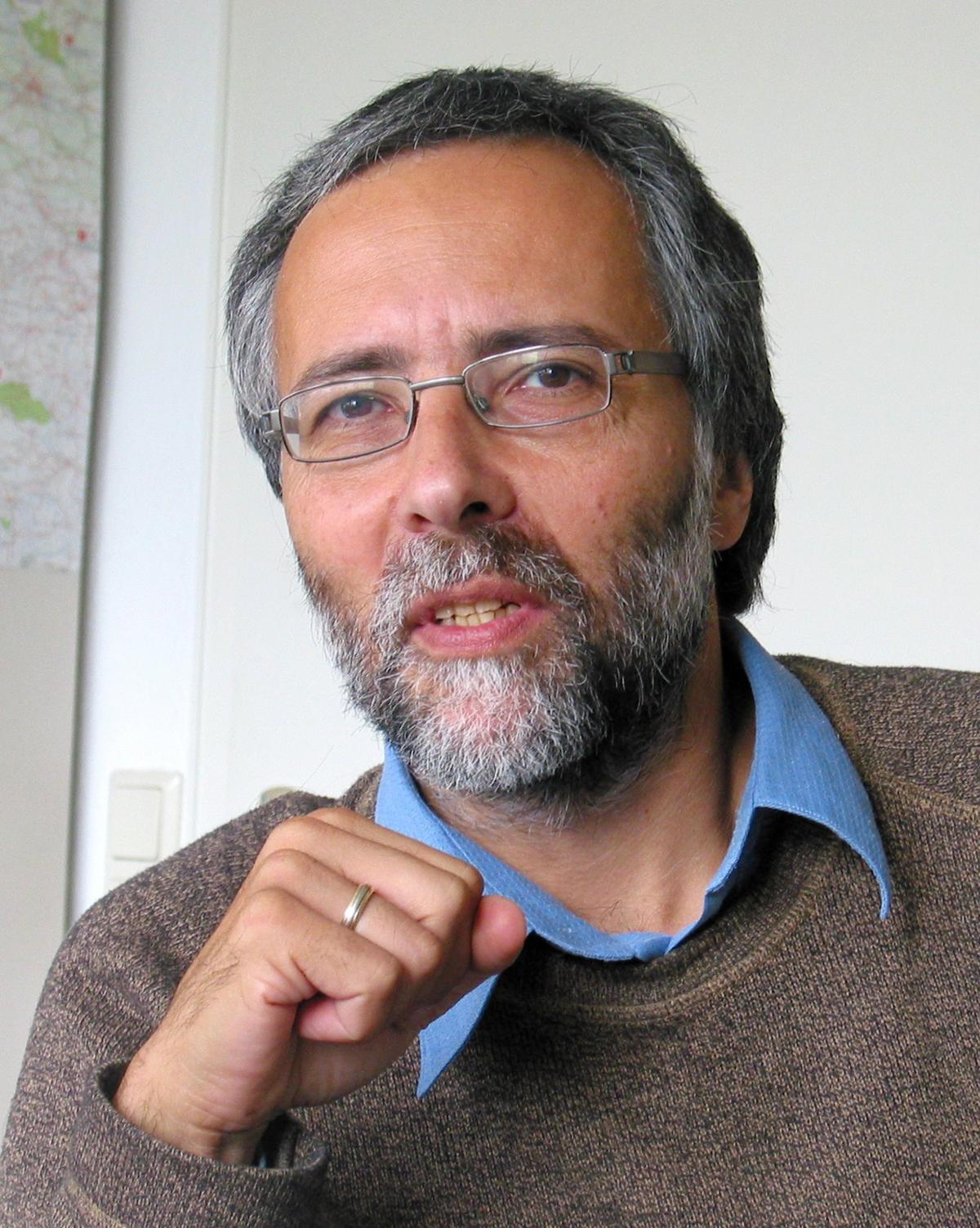
“The devil is in the details” - Journalists struggle to tell the rulebook story
Journalists at this year’s COP24 face a particularly daunting challenge: keeping readers on top of the negotiations on the rulebook that is critical for the Paris Agreement's implementation. The documents are often opaque to even those that cover domestic climate policy regularly, full of climate-speak and countless brackets with fought-over words that often sound all very similar to the uninitiated.
But newsrooms across the globe risk ignoring the nitty gritty details of the rulebook negotiations at their own and their readers' peril, because the ultimate content could make for a rude awakening if negotiations go ahead under the public's radar, warns Christoph Bals, policy director at the NGO Germanwatch and expert on international climate negotiations.
“The devil is in the details,” Bals told Clean Energy Wire. Without the necessary public scrutiny, “huge loopholes can be hidden in the rulebook.” Bals gave a few examples to bring the message home:
“If funds that were previously development funds for energy cooperation are now suddenly referred to as climate funds, then that is not the additional money that is needed.”
“If – with regards to financial goals – it is not clear whether only the support or also repayable loans are taken into account, the seriousness of the support cannot be assessed.”
“If you don’t make sure it’s about additional climate targets to the existing development plans, then you’d finance the business as usual in developing countries – and not the necessary transformation.”
NGO newsletter ECO explained another example: forest accounting rules. Setting the baseline too high by building them on “hypothetical projections that envisioned massive increases in emissions from the forest sector” could mean that countries claim credit for more reductions than actually happened.
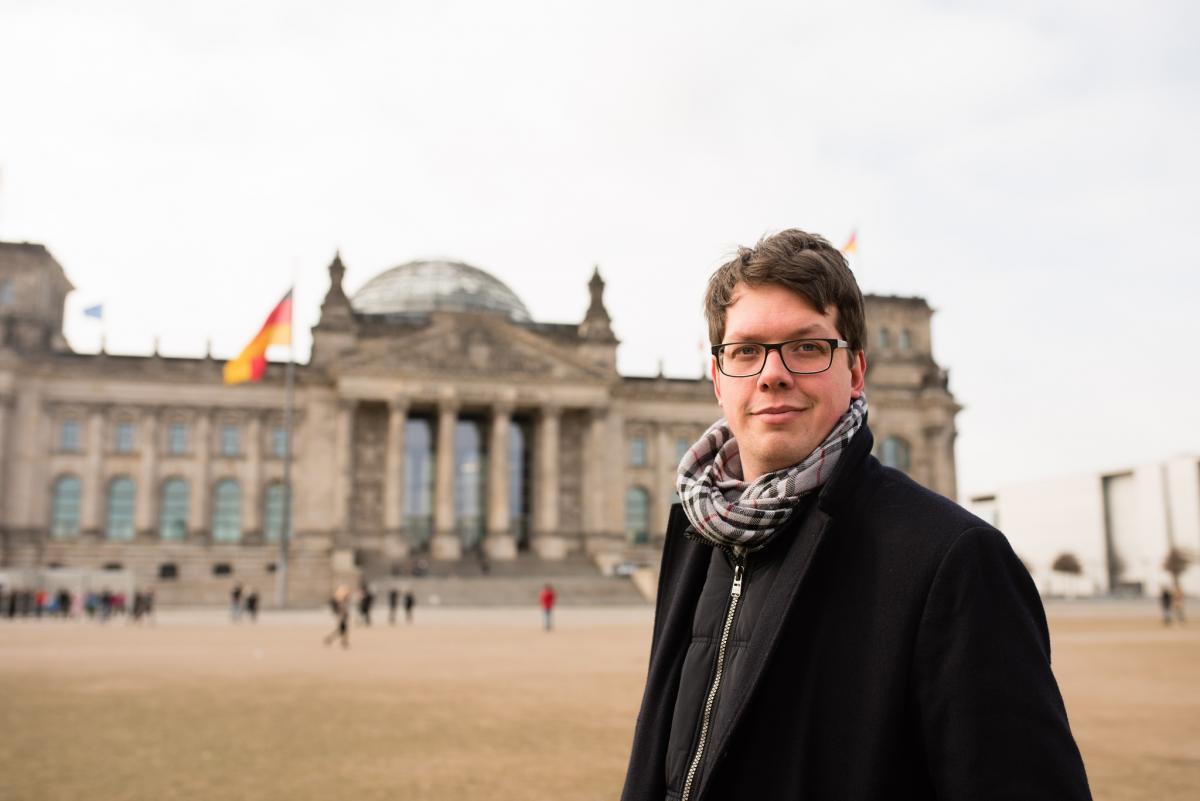
“German CO2 price debate is here to stay” - liberal MP
Negotiations on the “markets article” (Article 6) of the Paris Agreement are a bit on the side lines of the talks at COP24. While representatives of many countries and regions, e.g. the one of Canadian British Columbia don’t tire to point out that carbon pricing schemes are an economically feasible and successful way of reducing emissions, an international carbon market is nowhere on the horizon. But for Germany, the topic is nevertheless an interesting one, energy politician and MP in the federal parliament Lukas Köhler from the market-liberal, business-friendly Free democratic Party (FDP), tells Clean Energy Wire CLEW. Caught between the yellow-vest protests in France and upcoming European elections on the one side and the pressure to cut emissions from the transport sector in particular on the other, the idea of expanding Germany’s CO2 price to more sectors will nevertheless not go away again, he says.
Read the interview here.
"Stop taxing clean electricity to speed up energy transition"
The economical fundamentals are in place for an accelerated shift to climate-friendly energy systems, said Ditlev Engel, CEO for energy at risk management company DNV-GL, at the World Climate Summit - The Investment COP side event. Capital was available and cost for renewables and other key technologies such as batteries were falling.“Concerns of economics should be totally eliminated.” However, political frameworks often failed to support the move and needed to change, getting to the known toolbox of policy measures, he said.
“To the countries that signed the Paris Agreement: Why would anyone tax green electricity?” he asked, suggesting as an example that just by exempting renewable sources from energy taxes countries could create something like a “reverse carbon price”.
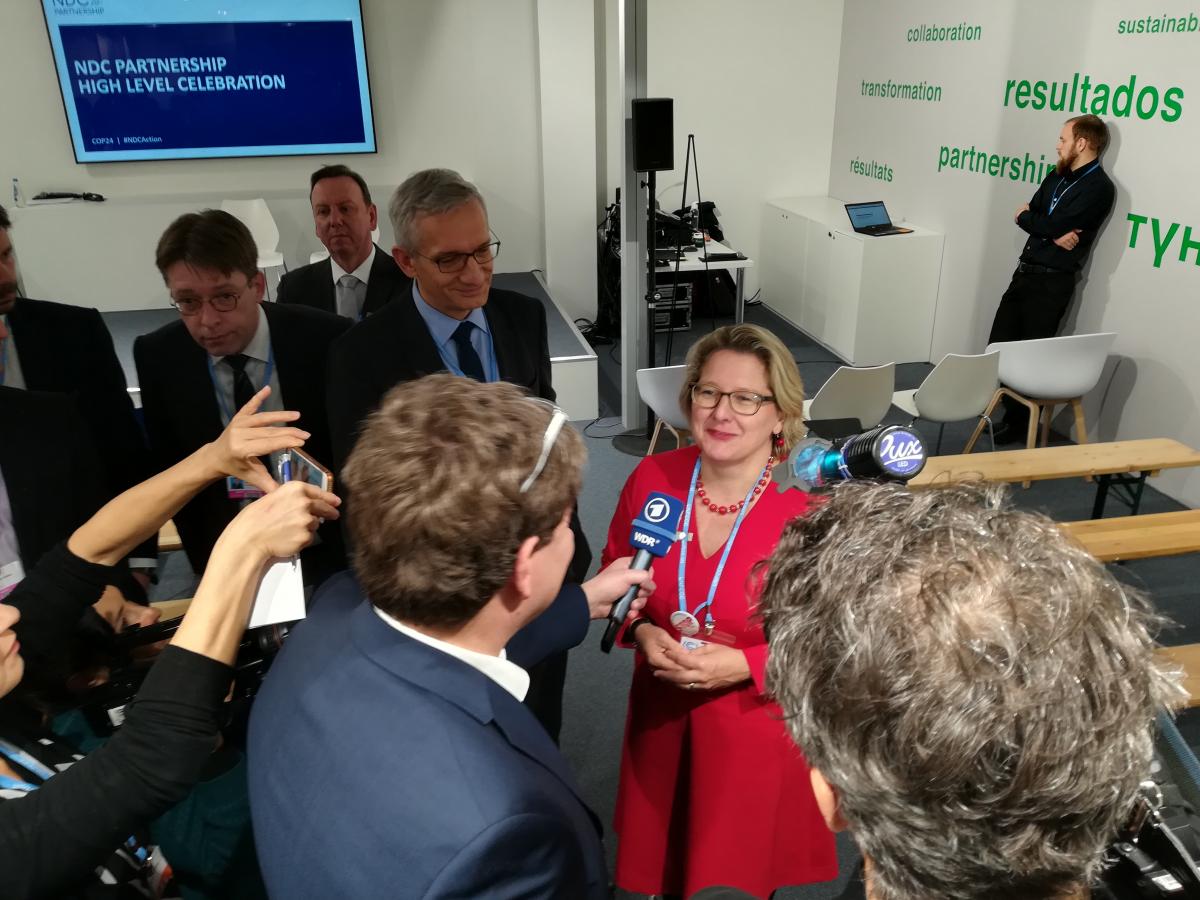
Germany pledges 68 million euros more to support developing countries implement their climate targets
The federal ministries for environment (BMU) and economic cooperation (BMZ) have announced to support the NDC Partnership with an additional 68 million euros. The initiative supports developing and emerging nations in implementing their national climate goals.
“It's a partnership at eye level. We talk with each other and help each other and that creates mutual trust,” environment minister Svenja Schulze told journalists. She added that such partnerships could help create a transparent set of rules to monitor climate action progress. “We help designing measuring instruments, we help countries to see where they stand on climate,” she said.
There are countries which have some catching up to do in this regard, said state secretary in the ministry for economic cooperation and development Martin Jäger. “This is an issue that we are discussing very intensively. Who reports how and to whom on what they have achieved. How do you measure that? That is now also the subject of negotiations here in Katowice with the adoption of a rule book for the Paris Agreement,” said Jäger.
Launched at the COP22 meeting in Marrakesh by Morocco and Germany, the NDC Partnership aims to enhance cooperation so that countries have access to the technical knowledge and financial support they need to achieve the goals set out in their nationally determined contributions (NDCs). 70 developing and emerging nations, as well as 17 industrial countries and 20 international organisations are part of the initiative.
Environment minister calls for larger EU budget for just transition in coal
The European Union should make more money available to support regions that have to deal with the consequences of the end to coal-fired power generation and coal mining, Germany's environment minister Svenja Schulze urged. “I would very much welcome it if in the next EU budget we could provide more funds for the regions affected by structural change,” Schulze told a press conference at COP24. This would also benefit German regions, she said.
Germany will support the exchange of experience between Europe's coal regions, she annonced. “We have around 40 coal regions in Europe, many of which face similar challenges to the German regions." It was important to provide an alternative to workers in the regions and involve them in deciding on a path to exit the fossil fuel, said Schulze. “If the people are not involved in the decision, then they put on yellow vests and demonstrate against it.”
Sharan Burrow, General Secretary of the International Trade Union Confederation (ITUC), seconded the minister’s comments. “We have to move quickly [on the coal exit], but we have to do it with the trust and support of the people in affected communities,” said Burrow. Otherwise, there was a risk of political unrest, she warned.
Hypocrisy? What hypocrisy?
Increasing efforts to combat climate change is at the heart of the Katowice negotiations and delegations from the EU and Germany are under scrutiny for supporting strict climate action at the negotiating table while showing considerably less ambition on the home front. In Brussels, the German government has – again – opposed stricter car emission levels. Austria, which holds the EU presidency at the moment, is pushing for a longer time-frame for coal subsidies in the ongoing reform of the European power market, something the country received the “Fossil of the Day Award” by Climate Action Network (CAN) this week. According to CAN, they do so under pressure from coal countries Poland, Bulgaria and Greece.
Asked about the contradictions between the stance in Brussels and in Katowice, Germany’s environment minister Schulze (SPD) told Clean Energy Wire CLEW: „As Germans, we are very much recognised here in the negotiations. Other countries see very clearly what Germany has achieved so far, what we have achieved with the Renewable Energy Act, what we have achieved with former governments of Social Democrats and Greens; how much we have contributed to the fact that renewable energies now exist in this form and scale. It is very much acknowledged that we are the ones who are building bridges in the negotiations, especially with the island states, with the vulnerable states and with those who still hold very tough positions here. We are in a position to build bridges. I believe that the EU has an enormously important role to play here. There have been other states that have led these talks in previous years, that are no longer visible here today, and the EU is increasingly taking the lead here and structuring negotiations and helping to make this COP a success.”
The growth story of the 21st century
The benefits of climate action are greater than ever before, while the costs of inaction continue to grow, said British economist and author of the landmark "Stern Review Report on the Economics of Climate Change" Nicholas Stern at a panel discussion in the German pavilion.
“We are already seeing remarkable momentum towards a low-carbon economy,” said Stern. “However, we must be bold in next 2-3 years.” Stern added that “there is no high-carbon long-run growth story.”
Stern officially handed over New Climate Economy’s September report “Unlocking the inclusive growth story of the 21st century” to German economy state secretary Martin Jäger (BMWi). “The climate discussion in Germany is often about costs, but in your report, you outline positive perspectives for the economy,” Jäger told Stern. The report presented an opportunity for policy makers to highlight the benefits of climate action.
Also on the panel was German climate researcher Ottmar Edenhofer, director of the Potsdam Institute for Climate Impact Research (PIK). Edenhofer said there are some risks to the energy transition’s growth story. One of these are rising interest rates. “Renewables are very vulnerable to rising interest rates. A few percentage points could fully neutralise technological progress we’ve seen since the Stern Report,” said Edenhofer.

